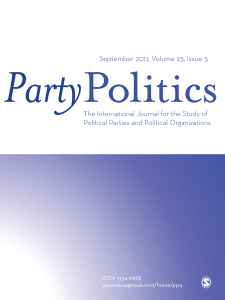Acta Politica by Fortunato Musella (University of Naples, Federico II)
The Presidentialization of Political Parties has been recently reviewed in Acta Politica

Book Review: “Presidentialization of Parties” on …
Party Politics (by Vít Hloušek, Masaryk University, Czech Republic)
 Only a few scholars would question the thesis concerning the recent increasing importance of the key members of the executive in democracies, a phenomenon related to the centralization of both executive power and the organization of political parties. Many scholars would, however, oppose or dispute the concept of the ‘presidentialization’ of politics that has been developed since the early 1990s to capture such a development. The recent volume edited by Gianluca Passarelli sheds new light on the concept and its analytical potential to unravel the processes of transformation of the organizational patterns of contemporary political parties. The volume covers the conceptual debate as well as 11 country studies. The opening chapter, written by the editor, offers an interesting conceptual introduction which not only provides the framework for the country studies but, above all, increases the analytical potential of the very concept of party presidentialization. Here the full article in PDF
Only a few scholars would question the thesis concerning the recent increasing importance of the key members of the executive in democracies, a phenomenon related to the centralization of both executive power and the organization of political parties. Many scholars would, however, oppose or dispute the concept of the ‘presidentialization’ of politics that has been developed since the early 1990s to capture such a development. The recent volume edited by Gianluca Passarelli sheds new light on the concept and its analytical potential to unravel the processes of transformation of the organizational patterns of contemporary political parties. The volume covers the conceptual debate as well as 11 country studies. The opening chapter, written by the editor, offers an interesting conceptual introduction which not only provides the framework for the country studies but, above all, increases the analytical potential of the very concept of party presidentialization. Here the full article in PDFNEW Book Review: The Presidentialization of Political Parties
on Political Studies Review (by Maximilien Cogels, University of Louvaine)
 While the study of presidentialisation is often combined with the concept of personalisation, Gianluca Passarelli decides to make a clear conceptual distinction between the two, focussing on the already highly debated study of the presidentialisation of politics. By starting with the premise that under certain circumstances presidentialisation is also possible in non-presidential systems (this is highly contested between scholars), this book takes a closer look at the presidentialisation of political parties in the world, advocating that the presidentialisation of politics stems from the behaviour of political parties. This collaborative book considers that political parties are the driving force behind the phenomenon. The authors study in this book the constitutional structures (opportunities and constraints) that affect presidentialisation while including party genetics (and their organisational changes over time) as an intervening factor. This is an original approach given the fact that these two dimensions are often studied separately. Indeed, the book is innovative in regard to two crucial points, the first being the study of these two dimensions together, and the second being its method of bringing together all types of democratic regimes. Leggi tutto “NEW Book Review: The Presidentialization of Political Parties”
While the study of presidentialisation is often combined with the concept of personalisation, Gianluca Passarelli decides to make a clear conceptual distinction between the two, focussing on the already highly debated study of the presidentialisation of politics. By starting with the premise that under certain circumstances presidentialisation is also possible in non-presidential systems (this is highly contested between scholars), this book takes a closer look at the presidentialisation of political parties in the world, advocating that the presidentialisation of politics stems from the behaviour of political parties. This collaborative book considers that political parties are the driving force behind the phenomenon. The authors study in this book the constitutional structures (opportunities and constraints) that affect presidentialisation while including party genetics (and their organisational changes over time) as an intervening factor. This is an original approach given the fact that these two dimensions are often studied separately. Indeed, the book is innovative in regard to two crucial points, the first being the study of these two dimensions together, and the second being its method of bringing together all types of democratic regimes. Leggi tutto “NEW Book Review: The Presidentialization of Political Parties”
Book Review: The Presidentialization of Political Parties
Book Review on Italian Political Science (by Luca Verzichelli, University of Siena)
 This volume is an important contribution to the field of comparative political institutions because it focuses on the growing role of party leaders who assume a relevant institutional power in many advanced democracies. The notion of “presidentialization” is at the core of the volume’s theoretical framework. However, in contrast to other pieces of empirical research emphasizing the impact of institutional changes on the development of party structures, the volume endeavors to explore the phenomenon of the increasing importance of party leadership independently from the evolution of the institutional setting. This is, as noted by the editor in the introduction, the “missing link” in the study of presidentialization. More precisely, Passarelli aims to explain the varying intensities of “party presidentialization” one can observe by comparing certain countries using a simplified framework built on two separate dimensions: institutional presidentialization and party genetic presidentialization.
This volume is an important contribution to the field of comparative political institutions because it focuses on the growing role of party leaders who assume a relevant institutional power in many advanced democracies. The notion of “presidentialization” is at the core of the volume’s theoretical framework. However, in contrast to other pieces of empirical research emphasizing the impact of institutional changes on the development of party structures, the volume endeavors to explore the phenomenon of the increasing importance of party leadership independently from the evolution of the institutional setting. This is, as noted by the editor in the introduction, the “missing link” in the study of presidentialization. More precisely, Passarelli aims to explain the varying intensities of “party presidentialization” one can observe by comparing certain countries using a simplified framework built on two separate dimensions: institutional presidentialization and party genetic presidentialization.
Leggi tutto “Book Review: The Presidentialization of Political Parties”
